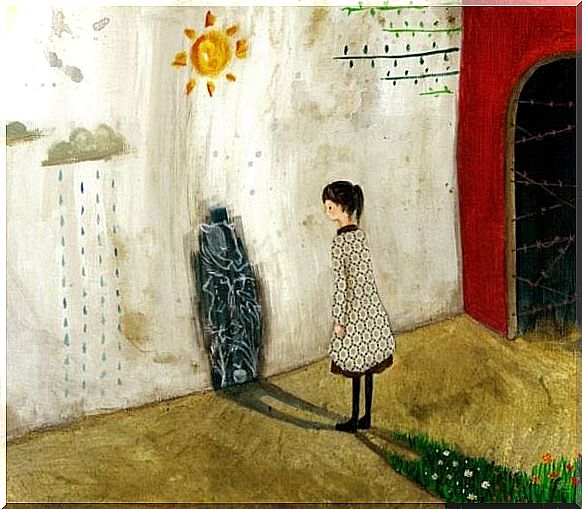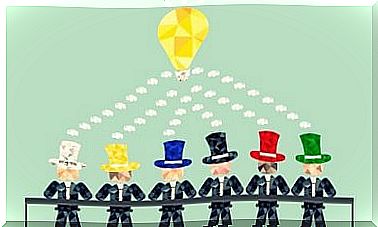First Black, Then White: Emotional Imbalance

It’s normal to be happier or more excited at some times than at other times. And it’s also normal to get angry when things don’t go the way you’d like. In short, emotions exist for a reason: to achieve our goals, to communicate and to survive.
The problem arises when these emotions can no longer adapt and the people who experience them get carried away, causing these people to exhibit behavior that only interferes with their daily activities. In other words, instead of solving problems, they just create more.
Emotional Imbalance
In psychology, this type of behavior is also called emotional imbalance. Emotional imbalance is a personality trait and the people who suffer from it experience constant mood swings for no apparent or rational reason.
Emotionally unbalanced people cannot tolerate frustration. When something doesn’t go the way they would like, it provokes a series of intense and extreme emotional reactions in them, such as anger or aggressiveness, whether towards others or themselves, drug use, debauchery… These are people who are very low self-confidence, very dichotomous thinking (seeing everything in black and white), communication problems and few facilities to deal with difficult situations in life.
In addition, these people are very impulsive and instinctive. They don’t think about the consequences before acting, leaving them with just more problems than they already had and still no idea how to deal with them.

However, they are very loving. They idealize other people, which can make them very emotionally dependent and move quickly from one partner to another because they cannot be alone. Emotionally unbalanced people often report that they feel constantly empty inside.
All these characteristics cause a lot of problems in their social life, work life and family life…
Emotional imbalance can be treated, although in this case it is very important that the imbalanced person is highly motivated to change and improve.
Unbalanced people will not be able to change overnight. This is because, as we mentioned above, their behavior is very internalized and automatic. But with enough practice and motivation, these people can also shape their personalities well.
Some techniques used in therapy to help people overcome their emotional imbalance are:
Cool the mind
People who suffer from emotional imbalance are often hotheads who react impulsively and quite explosively without thinking. These people must therefore learn to view their problems from a certain emotional distance, which allows them to better analyze their problems and thus learn to deal with them better.
One way to do this might be to simply distance yourself from the whole situation, engage yourself in another healthy activity that you enjoy (for example, it’s a bad idea in this case to get drunk to solve your problems for a while). forget). Walking the dog, going for a bike ride, listening to music, watching a movie on your own, etc. are healthy activities that can clear your mind and, after a while, can also significantly reduce your sense of anger and discomfort.
Troubleshooting
Taking a break from the situation and letting our anger calm down is very wise. Because of this we learn to look at things from a different perspective, but this solution is of course not permanent. At some point we have to face the difficult situation again.
In this case, the troubleshooting technique is very easy to apply and can be very helpful. The point of this technique is to come up with multiple solutions to your problem that don’t include anger or other inappropriate behavior, whether toward yourself or others. We must be clear and understand that no solution will be 100% beneficial; there will always be pros and cons associated with it. Once we’ve collected all the alternatives we could think of, we can start assessing these alternatives. Ultimately, of course, the intention is that you choose one solution from all these alternatives, the solution that offers the most advantages and the fewest disadvantages, and that you apply this solution.
When choosing, the idea is that at the same time you come up with a plan to deal with the disadvantages associated with this solution, so that they cannot surprise you and you will not react in frustration. What is especially important is to know how to make a choice and not to delay making this choice, to learn to accept situations that do not turn out the way we want them to.
Socratic dialogue with ourselves
The Socratic dialogue is a technique where we question our own way of thinking. Emotionally unbalanced people tend to have a wrong way of thinking, which causes them a lot of discomfort.
In order to apply this technique, we must first learn to identify the situation or problem that is causing us these intense emotions or discomfort. Once we’ve done this, the idea is to ask yourself how you feel about this situation or problem. The mindset of these types of people usually equates to things like, “If she didn’t call me, she must have completely forgotten about me, she just doesn’t love me.” By learning to recognize these kinds of harmful thoughts for what they are, we begin to question them. In this case, it can be very helpful to write down your doubts and answers in a notebook.
An example of how to question these thoughts is, “How can I be so sure that she doesn’t love me?” What more explanation could there be? Am I jumping to conclusions too much?’
When people ask themselves these kinds of questions and answer these questions based on the real situation, their emotions usually change completely, allowing them to adapt better and become a lot calmer.
Entertain through assertiveness
Emotionally imbalanced people lose the logic they may have in their behavior and the way they say things. This makes entertainment through assertiveness necessary. This can help them enormously with their self-confidence and relationship problems.

One of these assertiveness techniques is to learn to reach agreements. This technique is used when someone sees that their rights are being violated or when they become frustrated about something and need to express their discomfort in an appropriate way.
In this case, the aim is to follow the following steps: first of all, the aim is to appreciate the other person as a person and to put ourselves in him. “I understand you didn’t mean to.” Next, we should try to express the real cause of our discomfort, without blaming the other person. We all make mistakes from time to time and it is important to be able to distinguish between the people themselves and the way they behave. “Although I know you didn’t mean to, I feel bad because…”
By expressing our discomfort, we propose a solution to prevent the same problem from happening again, while at the same time taking into account the other person’s proposals and opinion. That way we can negotiate and come to an agreement together. There is absolutely no need to yell, argue or insult each other… This will only cause more problems, so we will never find a solution.
Simple, yet quite difficult. In this case, practice plays a very important role in learning to escape from that emotional prison you are trapped in. Give yourself the chance to be free and don’t allow your emotions to rule you and your life.









